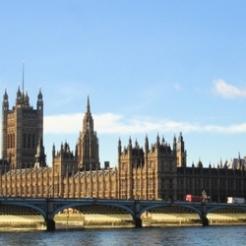Earlier this year sector leaders expressed concern that as we approach the general election politicians had little real narrative about the voluntary sector. Would a debate between the civil society representatives change their minds? Kirsty Weakley assesses each of the speakers.
Rob Wilson for the Conservatives
Wilson was suddenly thrust into the minister for civil society role on the eve of the Conservative Party Conference, and since then has been getting himself up to speed on all things charity and social investment.
Sometimes it does feel rather like he’s reading from a script (although after the reaction his predecessor’s off-the-cuff remarks about knitting you could see why he may have started out a little cautious).
Last night he seemed professed to be “proud” of the government’s achievements, listing National Citizen Service, the growth of the social investment market.
He seemed rather frustrated at having to answer questions about the political campaigning, saying that he had stated his view (“charities can be political but not party political”) at every event since he started in the job.
Unfortunately the promise of Lord Hodgson’s review of the Act doesn’t seem to cut it with the sector and his reluctance to appreciate the level of anxiety that the Act has created only goes to highlight how new he is to the sector.
As of yet, Wilson seems to have few new ideas, and to instead be resting on the laurels of what his party has already achieved.
Lisa Nandy for Labour
With a background the voluntary sector it is not surprising that Nandy was easily the politician who looked most comfortable in front of a room full of voluntary sector leaders.
In fact so comfortable that she answered the question about ring fencing public service contracts for the sector, one of Labour key policies, with “I don’t agree at all”, but before headlines that included the phrase “u-turn” could materialise, clarified that she was only kidding.
Tom Brake for the Liberal Democrats
We don’t hear much from the Lib Dems about their views on the voluntary sector, possibly a consequence of coalition politics, or maybe because they don’t have any?
Brake spent a good five minutes talking about the number of government contracts that have gone to small businesses (one-quarter if you’re interested). That’s very nice but some of the charities in the room were in fact rather large businesses turning over more than £100m per year.
Short of noticing that local authorities were an important partner for the charity sector he didn’t seem to any clear vision for the voluntary sector.
Nathan Gill, MEP, for Ukip
Ukip’s representative on the voluntary sector stared off by saying that he felt like “Daniel walking into the Lion’s den,” certainly appropriate given that we were at Church House.
He certainly brought a mixed bag of ideas. Some of which are summarised below:
- Government should pay for or encourage volunteers
- People will give to your cause if it’s strong enough
- Charities should not receive funding for public services because “it’s not up to charities to fill the void” and “allow the government to step away from its responsibilities” to people like armed forces veterans
- Donors should be able to claim more tax relief on donations, although charities should still get gift aid
- The Charity Commission should be scrapped
The audience was clearly not impressed, there were a few audible snorts when he was speaking, especially the suggestion that charities shouldn't receive public funding.
Bill Rigby for the Green Party
He didn’t say that much of note, other than to back up Labour on the Lobbying Act.
Like Ukip he was not particularly receptive to the idea of volunteers in the NHS, preferring that the next government invest in public services.
So did we learn anything?
In short, the sceptics were correct. If you had to pick a winner from last night's debate it would be Nandy, but in general there appears to be little vision among politicians for the voluntary sector. After last night, we mostly know what they don’t know.









